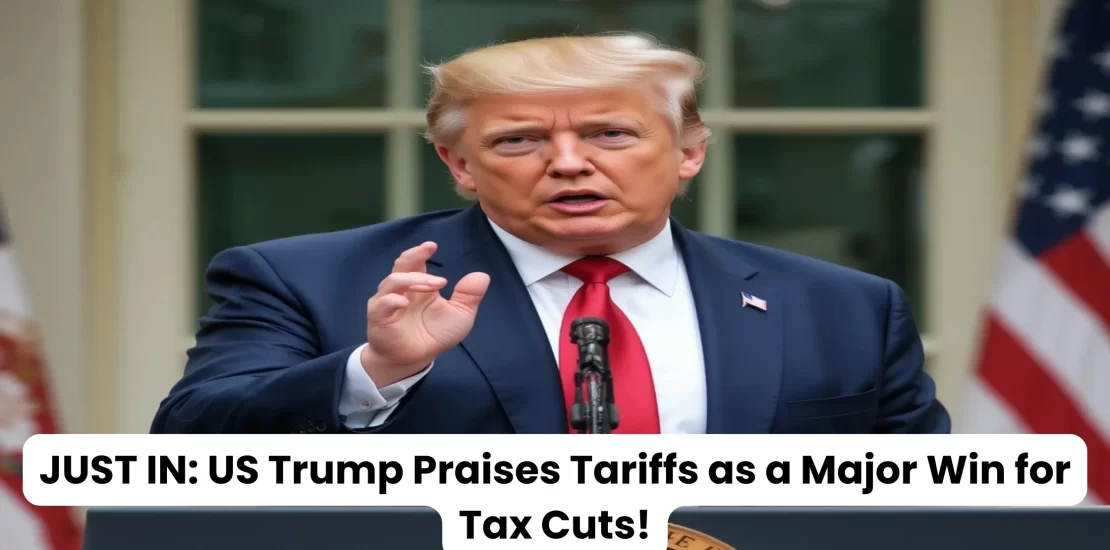- March 25, 2025
- Posted by: Jackson Bennett
- Category: News

Trump Tariff Tax Cuts
Washington, D.C. – In a significant policy declaration, President Trump’s advocacy of using tariff revenue to bring down income tax rates for the citizens of his country was underscored at a White House Cabinet meeting. Trump Tariff Tax Cuts rehashed that income taxes were to be eliminated for those earning below $150,000 per year; the result would be a substitution of such revenue by tariffs levied on imports falling under such income limit.
This form of taxation change, in the President’s opinion, would benefit taxpayers, whereas experts and lawmakers find themselves torn concerning whether it could realistically be imposed and whether its potential impact would be advantageous, but savings to taxpayers would incur considerable and even bold changes to U.S. fiscal policy.
The Tariffs to Reduce Income Tax
While President Donald Trump claims that tariff revenues should come to income tax for middle-income earners, it would offer millions of Americans tax relief as well as support local industries. Trump Tariff Tax Cuts planned mechanism for using tariff revenues in abolishing income taxes on Americans with individual incomes below $150,000 through tariffs on imports. This move will be complemented by a tariff of 25% on any country buying oil or gas from Venezuela and thus is intended to weaken the Venezuelan economy. Critics, however, have raised questions about the overall economic effects of this aggressive trade policy as the administration continues rolling out new pieces.
Economic Repercussions and Expert Opinions
Presidential tariffs have become a matter of heated debate among economists and policymakers. The government claims that the tariffs will raise enough revenue to offset a drop in income tax collections, but the critics allege that this kind of arrangement is not financially sustainable. Hence, the Trump Tariff Tax Cuts Tax Policy Center says, “if someone goes for huge tariffs, it could cut household income by as much as $3,000,” implying that it would be harmful to consumers.
However, the Tax Foundation kept itself busy re-evaluating the economic estimates of the revenue sale which would then accrue from these tariff policies.
International Trade Relations and Related Speculations
Concerns among major economies like China and India, both noted purchasers of Venezuelan crude oil, are being raised by the proposed 25% tariff on nations importing Venezuelan oil. It is being cautioned among analysts, however, that while in the worst-case scenarios, retaliatory tariffs of this kind could jeopardize international goodwill, the more likely case scenario is disrupting the international energy markets. For instance, it is estimated that in February, China was taking around 503,000 barrels a day of oil from Venezuela or 55% of Venezuelan exports. Trump Tariff Tax Cuts policies add another layer of complexity to the ongoing trade dynamics.
Concurrently, analysts in India are evaluating the economic impact of the U.S. tariffs on the imports of Venezuelan oil. Since India is a participant in the trade of Venezuelan oil, the tariffs will bear serious consequences for the energy sector and market paradigms of India.
Political Landscape and Legislative Hindrances
President Trump’s tariff-funded tax cuts are going to come under scrutiny from Congress members, including his party members. Interestingly, critics have particularly argued that a tariff-funded tax cut is unprecedented and may result in an unstable or low revenue stream. According to Reuters in January this year, the President also faced opposition from the Republican lawmakers on his plan that is foretold to have adverse economic outcomes.
Historical Background and Comparisons
Traditionally, tariffs had been among important federal revenues, especially in the 19th century. The changed structure of the modern economy and federal budget has led many experts to view the possibility of replacing income tax revenues with tariffs as less feasible. While highlighting that tariffs were once a foremost source of tax revenues, the Tax Foundation mentions the fact that current levels of federal spending make it difficult to rely solely on tariffs for financing government operations. Trump Tariff Tax Cuts proposals further intensify the debate on the feasibility of such a shift.
Market Reactions and Investor Sentiment
The imposition of targeted tariffs has provoked diverse responses from the financial markets. On Monday, Wall Street enjoyed a wild rally that day on news that administration officials were thinking of a more selective approach to tariffs that might exempt certain sectors and certain countries. The Dow Jones Industrial Average shot up nearly 600 points, with investors believing a more tempered trade policy was at hand.
A Controversial Shift
In stating that tariffs will enable lower taxes, Mr. Trump points to a structural change in U.S. economic policy designed to use trade measures to accomplish domestic fiscal goals. While the administration intends to maintain its course, the plan is under attack from economists, Trump Tariff Tax Cuts, some lawmakers, and international partners as well. Potentially, the implementation of these policies and their effects on the U.S. economy and global trade relations will remain under close watch as the scenario unfolds.
Add a comment
You must be logged in to post a comment.



